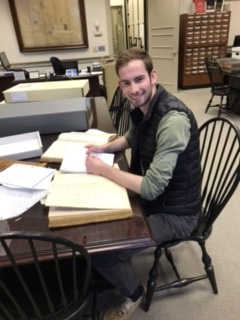Spring 2018 Internship in Review
 Over the course of this spring semester internship at the Cumberland County Historical Society I researched and curated a traveling exhibit on local nineteenth and twentieth-century brass bands. To be honest, when I first learned of my task, I mistakenly feared that one or two bands in Cumberland County would have little historical significance on the county’s history, not to mention even national and international history. Instead, my co-intern and I researched over 15 bands spanning the nineteenth and twentieth centuries. These bands included local municipal bands — the Carlisle Band and the Westshoremen — fire company bands — the Union Band (from the Union Fire Company) — as well as school bands — most notably the Carlisle Indian Industrial School Band.
Over the course of this spring semester internship at the Cumberland County Historical Society I researched and curated a traveling exhibit on local nineteenth and twentieth-century brass bands. To be honest, when I first learned of my task, I mistakenly feared that one or two bands in Cumberland County would have little historical significance on the county’s history, not to mention even national and international history. Instead, my co-intern and I researched over 15 bands spanning the nineteenth and twentieth centuries. These bands included local municipal bands — the Carlisle Band and the Westshoremen — fire company bands — the Union Band (from the Union Fire Company) — as well as school bands — most notably the Carlisle Indian Industrial School Band.
Throughout our research, my co-intern and I organized our county-wide bands into three common themes including militarism, local pride, and prominence. We found that the conclusion of the Civil War revitalized bands as individuals like Carlisle resident Peter Frederick Spahr played trombone in the 5th U.S. Cavalry Band and upon his muster-out of the army joined the “old Carlisle Band” as a buglist and played until his death. Additionally, we see the military’s impact on our bands through uniforms where most band directors looked as if they were military officers with lapels and brass buttons. We found that most Cumberland County residents lauded over these bands. Pictures of parades exhibit crowded sidewalks and local newspapers reported the dates of upcoming concerts and urged their readers to attend and support their local bands. Finally, we determined that the Carlisle Indian Industrial School Band and the Westshoremen represented the prominence of Cumberland County brass bands. The Indian School Band played in every presidential inaugural parade during the school’s existence and the Westshoremen won national and state competitions throughout the 1950s and 1970s and eventually won an international competition.
I enjoyed this internship because I was able to take my training as a history major out of the classroom and look at historical objects, pictures, and documents as windows into the past that tell a story. I firmly believe that internships are great ways to put classroom theory into practice. I learned how to perform archival research, how to use microfilm, and how to handle delicate objects. Through this internship I was able to refine those skills and it was nice to see my dedication in the classroom pay off in the real world. Additionally, I refer to primary sources as windows to the past. They are pure observatories into life including and beyond the specific topical research. For instance, in combing through newspapers (both on microfilm and on Newspapers.com) I occasionally caught myself reading the other, non-related articles in the newspapers. Furthermore, in reading various bands’ meeting notes I found different seemingly unrelated facets of information including receipts and other financial documents, band “politics”, and general information. At first glance, this information seems unrelated, however, these facets of tangential information serve to contextualize the bands in contemporary daily life. Ultimately these different pieces of information assisted in defining the narrative that bands were an integral part of nineteenth and twentieth-century daily life.
I look back at this experience as a success and I attribute a lot of that success to the nature and attitudes of the employees and volunteers here at the Cumberland County Historical Society. Everyone who I encountered took the time to answer project-related inquiries and career-related inquiries took. With that, I regard the Cumberland County Historical Society as a well-founded atmosphere that fosters an environment of professionalism and hands-on learning.
Greg Parker, Dickinson College
